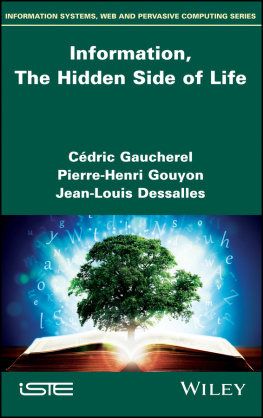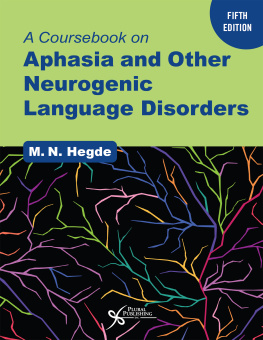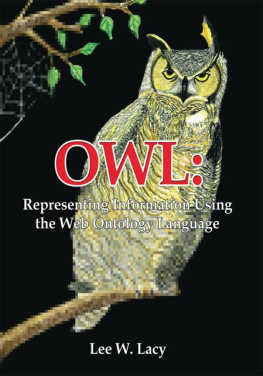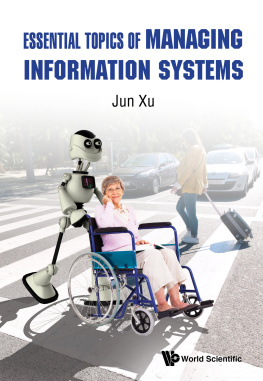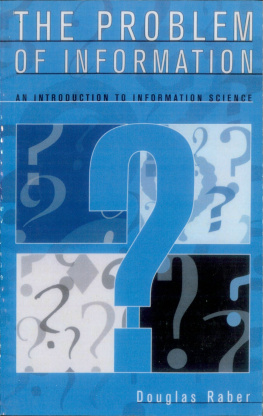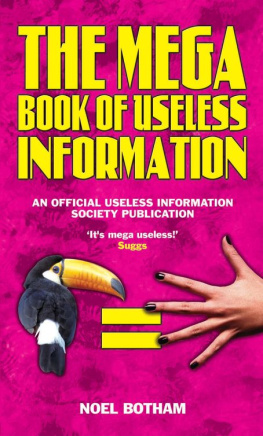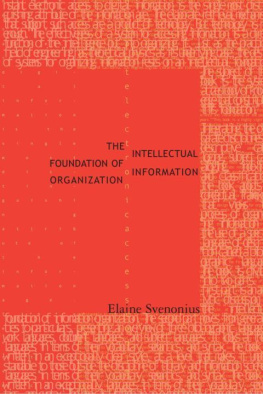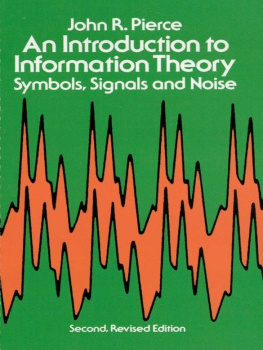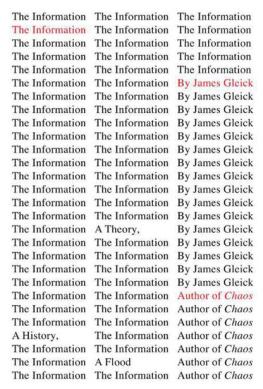
In the beginning was the Word
John 1:1
New International Version
Series Editor
Jean-Charles Pomerol
Information, The Hidden Side of Life
Cdric Gaucherel
Pierre-Henri Gouyon
Jean-Louis Dessalles

First published 2019 in Great Britain and the United States by ISTE Ltd and John Wiley & Sons, Inc.
Apart from any fair dealing for the purposes of research or private study, or criticism or review, as permitted under the Copyright, Designs and Patents Act 1988, this publication may only be reproduced, stored or transmitted, in any form or by any means, with the prior permission in writing of the publishers, or in the case of reprographic reproduction in accordance with the terms and licenses issued by the CLA. Enquiries concerning reproduction outside these terms should be sent to the publishers at the undermentioned address:
ISTE Ltd
27-37 St Georges Road
London SW19 4EU
UK
www.iste.co.uk
John Wiley & Sons, Inc.
111 River Street
Hoboken, NJ 07030
USA
www.wiley.com
ISTE Ltd 2019
The rights of Cdric Gaucherel, Pierre-Henri Gouyon and Jean-Louis Dessalles to be identified as the authors of this work have been asserted by them in accordance with the Copyright, Designs and Patents Act 1988.
Library of Congress Control Number: 2018960339
British Library Cataloguing-in-Publication Data
A CIP record for this book is available from the British Library
ISBN 978-1-78630-424-7
Preface
The reader of this sentence will cease to
exist when he has finished reading.
Metamagical Themas, Douglas Hofstadter
This book grew out of a meeting that brought together three scientists, who had different backgrounds, and who worked in different disciplines, but who all had this in common: their activities had to do with the living entity. Confronting each of them in their own way was the question: what is information?
Whether in ecosystems, human language, genetics or evolution of living organisms, one comes face to face with the idea that information forms the substance of the system(s) being studied, then reproduced, transmitted, coded and decoded, or manipulated in other ways. Such information may not be equally important to everyone, it may not be carried by the same channel, or perhaps even be of the same nature. Yet, one cannot afford to overlook the importance of the concept while continuing to speak of it without a proper understanding of what the much-used term means. The information that we exchange and talk about every day is coded in our language. Now, are other languages coded differently, say natures languages? Can we define them, analyze them and quantify them?
Quite possibly, part of what we are going to say here may appear obvious to some readers, but unacceptable to others. Considering the gap between these two reactions, however, it is reassuring that we come across both kinds of comment, perhaps in a sign that there is something non-consensual behind seemingly mundane ideas. Now, we are not quite done with this theme yet, and, in fact, this is going to open up further vistas of thinking. We hope that the publication of this essay will make possible an elaboration of the issue, and lead to fruitful discussions with those who find these questions interesting.
One difficulty that appears immediately pertinent has to do with the very nature of information. Is it material or is it not? The answer: while the channels used in transmitting it are material, information itself is not material.
Well, this is only the first of our difficulties. Our science does not readily accept non-material entities. Let us not forget that the absence of materiality was a major argument in the rejection of Newtons theory: the force of gravity appeared quite esoteric, since the force is acting at a distance, without material support. In contrast, the solar turbulences mentioned by Descartes appeared to be much more real or tangible. Yet, while following the same Aristotelian line of thinking, up to the end of the 18th Century, it seemed reasonable to consider fire an element, to the point of giving it a name: phlogiston. A process received the status of matter through a distortion of reality. It was left to the times of Lavoisier to demonstrate the difference between a material entity and a chemical reaction, and thereby to bring to an end a misconception that had persisted for over 2,000 years.
Let us rid ourselves of this obsessive habit of seeing everything in terms of matter. Information, even though carried by material agents, is nevertheless different from them. Now, how can a non-material entity act on matter? While trying to resolve this apparent paradox, we need to remember that, while information is certainly non-material, it is active across channels of communication, themselves material.
Does not Lo Ferr, in his Il ny a plus rien (Theres Nothing Any More), praise the non-material virtues of information?
Peddle your ideas like drugs You risk nothing at the borders. Nothing in your hands, nothing in your pockets, its all there in your head!
Anything to declare?
Nothing!
What is your name?
Karl Marx.
All right. Move on!
Indeed, Karl Marx probably produced nothing other than information. He bore no arms, raised no army. For all that, for this generation of ours, having lived in a world split into two blocs, through nuclear horror and the wars that raged from Vietnam to Nicaragua and Cuba and Afghanistan, and that reshaped (and continue to reshape) the geopolitical environment, how materially influential this information of Marxs has been.
While we (the three scientists) were still getting to know one another, one of us expressed to Jean-Marc Levy-Leblond his desire to work on the concept of information. Is that a concept? he had asked. Indeed, information is not yet a concept. Could we build one out of it?
Cdric GAUCHEREL
Pierre-Henri GOUYON
Jean-Louis DESSALES
October 2018
Introduction
Dear reader, do you know that an extraordinary happening is taking place at this very moment? Your eyes are taking in a linear message in a to-and-fro movement, line by line. The characters that make up the message are imprinting themselves on your retina, because of the sophisticated optical system that you possess. The retinal cells convert the stimuli into an impulse that then enters the brain. That organ then interprets the signal, and , well, the information that the text had embodied has now entered your mind! Now, dear reader, would you please turn the page?
Thank you. Now, did you notice that something incredible just happened? A piece of information, non-material, was carried by a means, which itself was material (we will say more about this a little later), as described above, and produced a result which was physical. You moved your finger, and turned the page! The physical was put through a change by the action of a piece of non-physical information. That is the sort of thing we are used to. Indeed, our body is a kind of machine that converts information into action. Certain types of information, such as the recipes you find in cookery books, are clearly meant for use with material things.
This work will attempt to consider whatever could be treated as information from the point of view of science. Our times appear to be very much under the influence of that entity. One might ask if this information-age society of ours is seriously looking into what it is that it is talking so much about. The sciences speak about it. Physics and mathematics have developed a now-classical theory of information. As we will see shortly, these disciplines have only captured a fragment of the idea that we have developed in this presentation. Biology has been advancing increasingly with the study of genetics and epigenetics. Ecology takes account of information relating to different levels of organizations, individuals and communities of species. Information underpins new and emerging fields of study such as communication science and technology. Linguistics and the different branches of the humanities also speak of information, which lies at the heart of the network of relationships. Now, what
Next page
